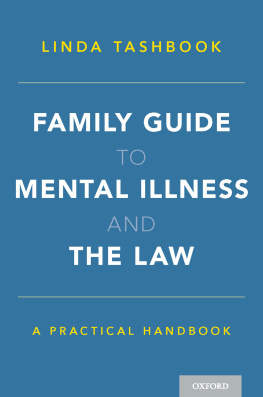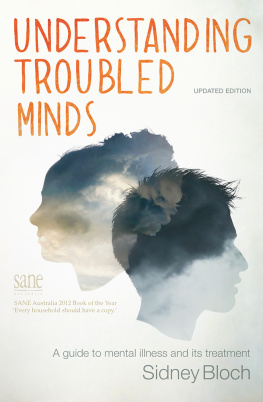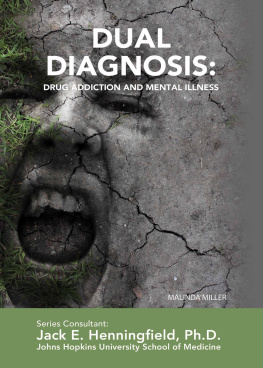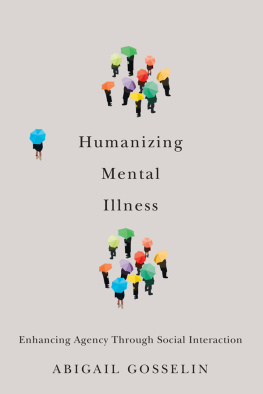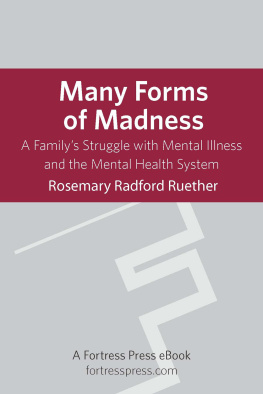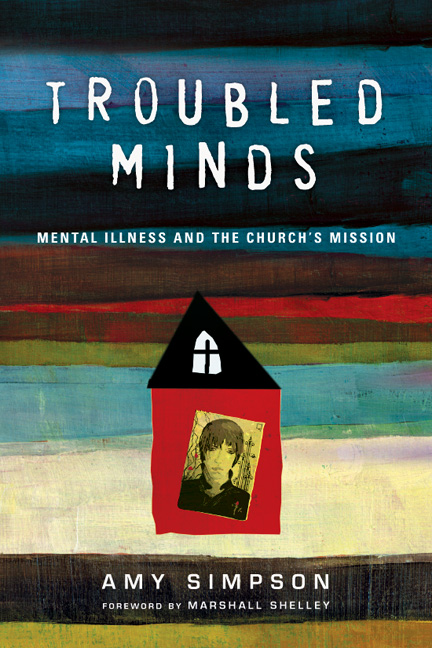Praise for Troubled Minds
In Troubled Minds Amy Simpson opens the door into the hidden struggles of those caring for a mentally ill loved one. Between descriptions of her own real-life experiences she eloquently presents information that every Christian should have on how to recognize and appropriately respond to those living with mental illness. This book will prompt you (and your church) to action among a suffering people.
Matthew S. Stanford, professor of psychology and neuroscience, Baylor University, and author, Grace for the Afflicted
Having written about my own familys experience with mental illness, I know what it must have cost for Amy Simpson to root her highly informative book in her familys heartbreaking, yet hopeful story. Because of stigma and ignorance, far too many of us live with the pain of mental illness in silence and without compassionate support from our Christian communities. Troubled Minds has the potential to help free us from that quiet loneliness and bring our churches into fuller communion with those who suffer. I highly recommend it.
Christine A. Scheller, news and religion editor, UrbanFaith
Amy Simpson gives deep insight into the pain of mental illness for those affected and those who love them. She makes puzzling concepts understandable, and she faces head-on the troubling questions raised by mental illness for people of faith. While I was reading the book, a homeless woman struggling with mental illness came to our church. Because of what Id read, I interacted with her more patiently and effectively. I count this a must-read for pastors and church leaders.
Karen Miller, LCSW, executive pastor, Church of the Resurrection, Wheaton, Illinois
InterVarsity Press
P.O. Box 1400, Downers Grove, IL 60515-1426
World Wide Web: www.ivpress.com
Email: email@ivpress.com
2013 by Amy Simpson
All rights reserved. No part of this book may be reproduced in any form without written permission from InterVarsity Press.
InterVarsity Press is the book-publishing division of InterVarsity Christian Fellowship/USA, a movement of students and faculty active on campus at hundreds of universities, colleges and schools of nursing in the United States of America, and a member movement of the International Fellowship of Evangelical Students. For information about local and regional activities, write Public Relations Dept., InterVarsity Christian Fellowship/USA, 6400 Schroeder Rd., P.O. Box 7895, Madison, WI 53707-7895, or visit the IVCF website at < www.intervarsity.org >.
Unless otherwise indicated, all Scripture quotations are taken from the Holy Bible, New Living Translation, copyright 1996, 2004. Used by permission of Tyndale House Publishers, Inc., Wheaton, Illinois 60189. All rights reserved.
All sidebar survey data comes from Leadership Journal survey on mental illness in churches, 2010. Used with permission from Leadership Journal/Christianity Today.
While all stories in this book are true, some names and identifying information in this book have been changed to protect the privacy of the individuals involved.
Cover design by Cindy Kiple
Interior design by Beth Hagenberg
Images: striped composition: Qweek/iStockphoto; young male: Pleio/iStockphoto
ISBN 978-0-8308-4304-6 (print)
ISBN 978-0-8308-8432-2 (digital)
To my mother,
whose courage and spirit have
endured through suffering;
to my father,
whose faithfulness inspires my own;
to Trevor,
whose love helped bring me
to a place where I could write this,
and who hounded me until I
did something about it;
to Scott, Cheryl and Kate,
whose character through suffering
has sharpened mine;
and to my children,
who inspire me to be a stronger, healthier mom.
With all thanks and gratitude to God,
who has never let go of me.
Contents
Foreword
O ur culture has become increasingly transparent. Self-disclosure is accepted, even expected, in many settings. Whether in churches or bars, support groups or Bible studies, classrooms or offices, people feel free to talk about fears and phobias, addictions and abuse, issues in their family of origin, issues in their marriage and the challenges of being single.
For more than thirty years I have worked with church leaders, collecting their wisdom and hard-won insights to be published in Leadership Journal. Pastors almost universally have told me that people in their churches are now openly revealing things they would have kept silent about a generation ago: struggles with drugs, alcohol, gambling, pornography, affairs, domestic violence, estranged sons and daughters.
But in this day of increased openness, one topic is still taboo.
Mental illness.
Just today I was with a pastor in New Jersey, and I asked him if he was aware of anyone in his congregation who was taking medications for a mental illness. His immediate response was, Youre kidding, right?
At first I misunderstood his response. I thought he meant that he was not aware of anyone. But then he said, Of course there are people on meds. Mostly for severe depression and anxiety, but also several for bipolar disorder.
How open are they about their condition? I asked.
No one knows, he said. Theyve each told me, but they wouldnt feel comfortable talking openly about this. Mental illness is still very hard to admit to, even in a relatively safe small group. Im grateful that these folks have shared their secret with me, their pastor.
Why do you think they told you?
For most of them, because they wondered if it was okay to take meds for this condition. They wondered if it was a spiritual problem that they should just pray away. My job was to tell them I would indeed pray for them, but that mental illness is a condition like any physical illness. And that means it needs to be treated in medically appropriate ways, and often that means medication.
Almost two years ago I started talking about this topic with Amy Simpson, my colleague at Christianity Today. We both had experienced mental illness in our families, and we began wondering at the silence about mental illness in our church culture. Why is it easier to request prayer for alcoholism or addiction to pornography than for panic attacks or bipolar disorder?
Amy agreed to write an article for Leadership Journal about her familys experience. As we discussed plans for that article, we wondered how pervasive mental illness was within the church, and how churches were responding to it.
So in partnership with Leadership Journal, Amy conducted a survey of five hundred churches to get a sense of the scope of the problem. The results were overwhelming. Almost every church leader who responded (98.4 percent) indicated they are aware of mental illnesses or disorders among people in their congregations. (More details of the survey findings are reported elsewhere in this book.) This is hardly surprising, since almost 25 percent of the adult population has experienced some form of mental illness requiring medication, from depression to borderline personality disorder to autism to bipolar disorder to schizophrenia to posttraumatic stress disorder to obsessive-compulsive disorder to panic disorder.
If these church leaders are representative, nearly every church includes people with mental illness in its congregation.
But very few are confident in knowing how to respond. Mental illness, after all, is still a hard topic to talk about.
As Amy points out, even as were enthusiastically delivering meals to people suffering physically, we are largely ignoring the afflictions of a quarter of our adult population who are suffering mentally. Thats about equal to the total percentage of people diagnosed with cancer each year, those living with heart disease, people infected with HIV and AIDS, and those afflicted with diabetescombined! No wonder several people Amy talked with called mental illness the no-casserole illness.


